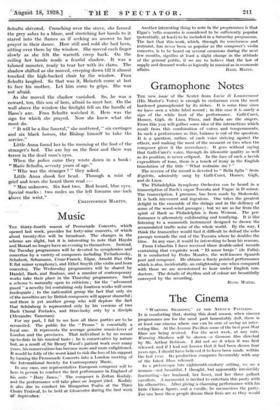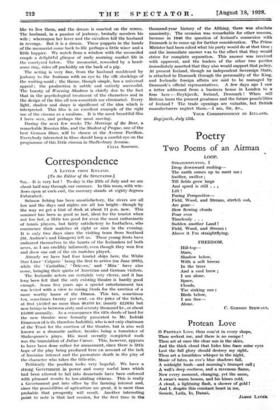The Cinema
" WARNING SHADOWS," AT THE AVENUE PAVILION.
IT is comforting that, during this dead season, when cinema programmes are for the most part lamentably dull, there is at least one cinema where one can be sure of seeing an inter- esting film. At the Avenue Pavilion some of the best post-War films are being revived. For the next week, at any rate, Warning Shadows will be shown—a German film directed by Mr. Arthur Robison. I did not see it when it was first released, and if I had not known that it had been shown four years ago, I should have believed it to have been made within the last year. Its production compares favourably with any of the latest films released.
In a picturesque late eighteenth-century setting, we sec a woman—not beautiful, I thought, but apparently irresistibly fascinating —her husband, her ,lover, and her three gallant cavaliers. A mesmerist is invited to entertain this party with his silhouettes. After giving a charming performance with his little Chinese figures and a candle, he mesmerizes the party. For one hour these people dream their lives are as they would like to live them, and the dream is enacted on the screen. The husband, in a passion of jealousy, brutally murders his wife ; whereupon her lover and the cavaliers kill the husband in revenge. But it is a dream. These puppets in the hands of the mesmerist come back to life perhaps a little wiser and a little happier. We watch from a window with the reconciled couple a delightful glimpse of early morning market life in the courtyard below. The mesmerist, rewarded by a hand- some ring, rides off puekishly on the back of a pig.
The acting is very fine, from the husband maddened by jealousy to the footman with an eye to the silk stockings of the waiting-maid ; the theme, though simple, has a universal appeal ; the production is subtle and entirely successful. The beauty of Warning Shadows is chiefly due to the fact that in the psychological treatment of the characters and in the design of the film all non-essentials are eliminated. Every light, shadow and shape is significant of the idea which is interpreted. This film is an excellent example of the right use of the cinema as a medium. It is the most beautiful film I have seen, and perhaps the most moving.
During the next few weeks The Marriage of the Bear, a remarkable Russian film, and the Student of Prague, one of the best German films, will be shown at the Avenue Pavilion. Everybody interested in films should keep a careful eye on the programme of this little cinema in Shaftesbury Avenue.
('ILIA SIMPSON.

































 Previous page
Previous page